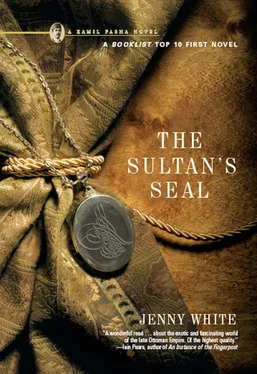Jenny White - The Sultan's seal
Здесь есть возможность читать онлайн «Jenny White - The Sultan's seal» весь текст электронной книги совершенно бесплатно (целиком полную версию без сокращений). В некоторых случаях можно слушать аудио, скачать через торрент в формате fb2 и присутствует краткое содержание. Жанр: Исторический детектив, на английском языке. Описание произведения, (предисловие) а так же отзывы посетителей доступны на портале библиотеки ЛибКат.
- Название:The Sultan's seal
- Автор:
- Жанр:
- Год:неизвестен
- ISBN:нет данных
- Рейтинг книги:5 / 5. Голосов: 1
-
Избранное:Добавить в избранное
- Отзывы:
-
Ваша оценка:
- 100
- 1
- 2
- 3
- 4
- 5
The Sultan's seal: краткое содержание, описание и аннотация
Предлагаем к чтению аннотацию, описание, краткое содержание или предисловие (зависит от того, что написал сам автор книги «The Sultan's seal»). Если вы не нашли необходимую информацию о книге — напишите в комментариях, мы постараемся отыскать её.
The Sultan's seal — читать онлайн бесплатно полную книгу (весь текст) целиком
Ниже представлен текст книги, разбитый по страницам. Система сохранения места последней прочитанной страницы, позволяет с удобством читать онлайн бесплатно книгу «The Sultan's seal», без необходимости каждый раз заново искать на чём Вы остановились. Поставьте закладку, и сможете в любой момент перейти на страницу, на которой закончили чтение.
Интервал:
Закладка:
Kamil stops a moment to let his eyes adjust, then looks around. The entryway is blind, designed so that no one standing outside can see into the inner quarters. There is a rack for shoes, empty now. He moves to the door at the end of the hidden leg of the room. He does not hear Michel enter behind him, but knows he is there. This door leads to a platform around a square expanse of water. The sea sucks noisily at the flimsy pillars that hold the structure above the level of the water.
He clicks his tongue in disapproval. “I doubt this will be standing by midsummer.”
“They’ll repair it before they open. They can’t afford to have naked society ladies swept away by the current.”
Ringing the platform are wooden cubicles with low wide shelves that, in season, would be cushioned so that bathers could lounge on them and drink tea. Each cubicle is faced with a slatted double door that can be closed for privacy or flung open so that the occupant can face the captured sea and chat with other bathers.
They begin methodically to search each cubicle, Kamil moving clockwise and Michel counterclockwise around the hamam.
“There’s a mattress here,” Michel calls. Kamil comes over to look. It is an expensive one, stuffed with wool and covered in flowered cotton. On a high shelf, he finds two tea glasses, of cheap quality but showy, decorated with crudely painted gold flowers. Michel gets his leather bag.
“What do you have in there?”
“Things we might need.” He pulls out a squirming sack and extracts a black and white kitten. “A quick test. I dilute any residue, then put a drop of the liquid in his eyes; if they dilate, we know we have datura.” He pushes the kitten back into the sack and cinches it.
Kamil is amused by the surgeon’s innovation. He hands the glasses to Michel, who examines them thoroughly.
“Too bad,” a disappointed Michel comments. “No residue.”
Kamil is looking over the lip of the bathing platform.
“This isn’t very deep. I wonder if there’s anything down there.”
“If I wanted to get rid of something quickly, what better way than to drop it into the water? The current would take it away.”
Kamil lies on his stomach and looks under the floorboards.
“Yes, but look.”
Michel kneels and looks under the floor as well. Backsplash wets their faces. A fishing net, attached to the bottom of the hamam, extends around the entire perimeter.
“I suppose that’s to keep undesirable creatures-human and otherwise-out of the pool,” comments Michel, grinning. “Let’s see what we’ve caught.”
Michel strips to his undergarments and lowers himself into the chilly water. He seems not to notice the cold, but goes about his work slowly and methodically, his powerful legs cutting effortlessly through the chest-high water. He ducks under the floor and pulls the net toward the center, then hands it to Kamil squatting on the platform above. Slowly, hand over hand as he saw the fishermen do in his youth, Kamil hauls it in. Michel pulls it up from below so that nothing is lost. When the entire sodden net has been dragged onto the wooden floor, Michel climbs out of the water and dons his clothing. The two men untangle the net and check their catch. Before long, Kamil points to a white gleam amid the slippery brown sea grass, pieces of clothing, and other debris. It is a teapot.
Its lid is missing but the contents are still inside. Michel reaches in and extracts a wad of faded yellow-green matter, bloated and slimy from long immersion in the water. The shape is no longer recognizable, but it is not the short black bristles of ordinary tea. Michel folds the leaves into a piece of oiled cloth.
They place several other items from their catch into a small bag: a broken tortoise-shell comb, a small copper-backed mirror, a woman’s slipper-items owned by a thousand women. Kamil examines a small knife, its horn handle swollen and separated into layers, but its blade clean of rust and still sharp.
“Odd thing to find in a woman’s bathhouse.” He wraps it up and places it in the bag. “Let’s look outside.”
Stooped low, hands clasped behind his back, Kamil paces the rocky sand surrounding the structure. He stops for a moment to listen, sniffs the air, then strides over and pulls aside the low-growing branches of a pine tree. He averts his face to avoid an explosion of flies and calls Michel over. At his feet is the carcass of a dog.
THE FOLLOWING DAY, Kamil watches as Michel cuts up the tea leaves, soaks them in alcohol mixed with sulfuric acid, and heats the mixture slowly.
“This will take a while. It has to heat for half an hour, then cool.” Michel sits at a desk in the cluttered room that serves as his laboratory and office in the Police Directorate, a large stone building on a side street off the Grande Rue de Pera. Tethered by a string to the base of a cabinet, the kitten is lapping at a saucer of milk.
“Call me when you’re done.” Kamil returns to a divan in the entrance hall and props a writing desk on his lap. He extracts from his coat a file on the case he is prosecuting the following morning, a Greek man accused of stabbing his wife’s brother to death when he tried to intervene in a family argument about property. The other family members refuse to testify, but several neighbors heard the altercation.
Murder is always about property, thinks Kamil, not passion in the way poets define it. Passion about something or someone simply means demanding ownership or at least control. Parents want to own their children, husbands their wives, employers their apprentices, supplicants their God. The most passionate of all destroy what they own, thereby making it forever theirs. Much of the world, from politics to commerce, is driven by fear of losing control over people, land, things. Fear that fate is stronger than will. Kamil places his trust in will.
What do I fear? he muses. Is there anything I love so passionately that I would kill to retain it? He can think of nothing and this makes him sad. A memory stirs in him of the moment he found the rare black orchid now in his greenhouse, of breathing its perfume for the first time. This evokes an image of Sybil’s violet eyes. He feels his senses, the surface of his skin, expand to an almost painful brilliance; his breath quickens. He smiles and thinks, I am not as desiccated as all that. As if passion were a virtue.
A young clerk bows, startling him. “The Doctor Efendi is waiting for you.” Abashed, Kamil hides his face from the young man before him, busying himself by gathering his writing utensils and placing them in a narrow box that he slips into his sash. By the time the clerk leaves him at the door of Michel’s office, Kamil has pushed all thoughts of Sybil from his mind and his body is once again the clean-swept temple of will and reason.
Michel has already strained the mash of leaves and is passing the liquid through a moistened filter. He transfers the strained liquid to a test tube and adds ether, then shakes and strains it again. He then adds potash and chloroform, which cause the liquid to separate. The room reeks of chemicals, but neither man notices. Michel pours the remaining liquid onto a watch glass and waits for the chloroform to evaporate. He scrapes the residue into a test tube and dilutes it with water and a drop of sulfuric acid.
“Now we can examine it.”
He takes a drop of this solution and places it on a glass. He stirs in a drop of bromine and waits. The liquid doesn’t change color.
“There should be a precipitate,” Michel mutters.
He tries various other reagents, but the liquid does not crystallize. The workbench is littered with watch glasses and test tubes. He turns to the sodden mass of cut-up leaves.
“This is not datura. Sorry. An unusual type of leaf, a tea of some kind, but not tube flower.”
Читать дальшеИнтервал:
Закладка:
Похожие книги на «The Sultan's seal»
Представляем Вашему вниманию похожие книги на «The Sultan's seal» списком для выбора. Мы отобрали схожую по названию и смыслу литературу в надежде предоставить читателям больше вариантов отыскать новые, интересные, ещё непрочитанные произведения.
Обсуждение, отзывы о книге «The Sultan's seal» и просто собственные мнения читателей. Оставьте ваши комментарии, напишите, что Вы думаете о произведении, его смысле или главных героях. Укажите что конкретно понравилось, а что нет, и почему Вы так считаете.












